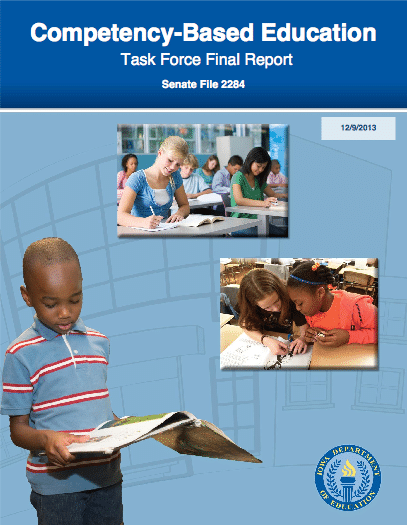Iowa Competency-Based Task Force Release Report
CompetencyWorks Blog
 Iowa has released the final report of the Competency-based Task Force. To remind you, in 2012 Iowa’s state legislature passed legislation (Senate File 2284 and House File 215) to study competency-based instruction and develop a strategic plan. It’s an easy report to review and provides insights into how a state can move forward in competency education. (For those of you who haven’t read it, Necessary for Success provides an overview of how states are advancing policy to catalyze, incubate and support competency education as well).
Iowa has released the final report of the Competency-based Task Force. To remind you, in 2012 Iowa’s state legislature passed legislation (Senate File 2284 and House File 215) to study competency-based instruction and develop a strategic plan. It’s an easy report to review and provides insights into how a state can move forward in competency education. (For those of you who haven’t read it, Necessary for Success provides an overview of how states are advancing policy to catalyze, incubate and support competency education as well).
Below are some of the highlights of the 13 recommendations from the Task Force for the legislature, Department of Education, and other institutions. It’s helpful to know in reading the recommendations that Iowa has established 4 principles for competency-based education (CBE): (1) Students advance based on proficiency; (2) Competencies include explicit, measurable, and transferable learning objectives that empower students;(3) Students receive rapid, differentiated support based on their individual learning needs; and (4) Learning outcomes emphasize competencies that include application and creation of knowledge along with development of important skills and dispositions. (See Department of Education’s Guidelines for PK-12 Competency-based Pathways.)
- Expand competency-based credits: Allow students younger than ninth grade to earn credit in any curricular area toward graduation if they complete the requirements for the credit. Current code specifies that such credit can be earned before ninth grade, but only in the curricular areas of English or Language Arts, mathematics, science, or social studies.
- Model competencies: The Department of Education, the Iowa CBE Collaborative, and other state and national experts should write model competencies that align with the Iowa Core and the universal constructs. In the preliminary report, the Task Force developed a Competency Validation Rubric to help districts develop competency frameworks.
- Evaluation: Develop a research partnership with an institution of higher education to monitor and evaluate CBE systems and share findings.
- Higher Education: Establish a collaborative team between Department of Education and higher education (1) to support smooth transitions to postsecondary institutions for students with competency-based educational experiences in high school, (2) to work toward instituting training for pre-service teachers and aspiring administrators in competency-based environments, and (3) to encourage competency-based pathways in postsecondary opportunities for all Iowans.
- Information System: The Department of Education should continue the Request for Proposal (RFP) process to find a suitable vendor for monitoring and reporting learning in a competency-based system.
- Professional Development: Over the course of the Iowa CBE Collaborative, the Department of Education and the collaborative, in collaboration with the Area Education Agencies, should define and support the professional learning districts will need for teachers and administrators to provide competency-based learning environments for preschool through high school and investigate and develop what to provide for parents, community members, legislators, State Board, and other stakeholders.
- Funding the process to implement CBE: Fully fund the work of transformation from the current system of education to a competency-based system with $1,000,000 per year for at least five years for: consultants to lead the work of the Iowa CBE Collaborative and assist Area Education Agencies and other districts developing competency-based systems during the collaborative and to lead the work of statewide implementation after the collaborative; grants to support districts in the Iowa CBE Collaborative; development and delivery of professional development; writing of model competencies; development of model performance tasks and assessment; purchase of a recording and reporting system; and evaluation of the process and progress.
The report also refers to the importance of blended learning with recommendations for better internet access and to continue investing in technology for students.
You’ll also find a summary of the research from the first two districts implementing CBE pilots, Spirit Lake and Muscatine, in the report as well as an overview of the Collaborative of 10 districts now beginning the process.